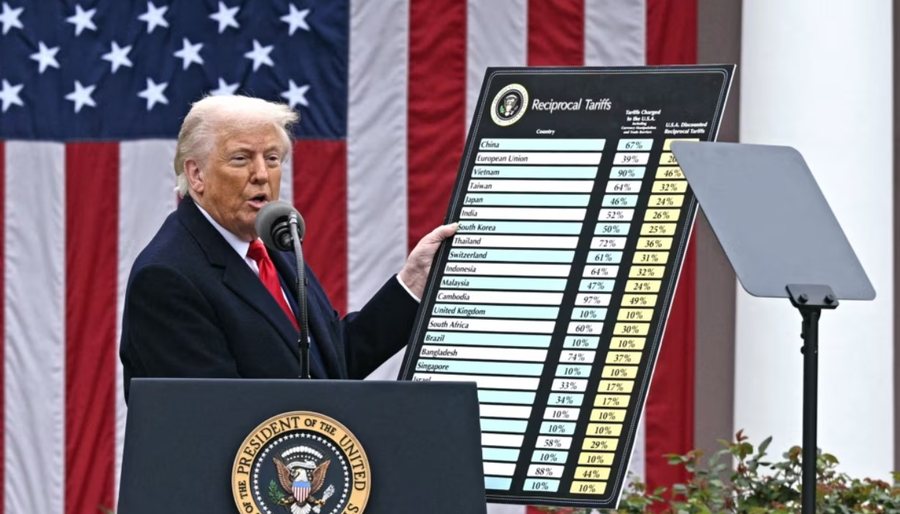
United States President Donald Trump's announcement on April 2 of the highest tariff increase in over 100 years has shocked stock markets and shaken the global economy.
"This has not been seen in a century in terms of the scale of the tariffs, the number of countries affected and just the sheer scale of these tariffs," Emily Kilcrease, a researcher at the Center for a New American Security (CNAS), told Radio Free Europe (RFE/RL).
"I think we will see shocks that we cannot fully predict, because we have never seen such a high level of tariffs in the era of globalization," she stressed, according to A2.
This global shock could hit the European Union particularly hard, economists told REL.
The direct impact of Trump's 20 percent tariff on EU products has fueled fears about potential inflation and the economic future of hard-hit manufacturers within the 27-nation bloc, who are already suffering from US tariffs on cars and steel.
Experts say that other large sectors, such as Europe's pharmaceutical industry, which exports heavily to the American market, could also be severely affected.
"These pharmaceutical companies will try to sell as much as they can in the US," Reid I'Anson, an economist at the business intelligence firm Kpler, told REL.
How powerful will the impact of Trump's tariffs be for Europe?
"They may lower prices a little to remain competitive, but it is very likely that demand in the US for European goods will fall. This will be reflected in a weaker economic environment in Europe," he underlined.
Tariffs are essentially a tax paid by importers and usually passed on to distributors, wholesalers and retailers, and ultimately consumers.
About 60 countries that have the largest trade surpluses with the US - including key allies such as the EU, Japan and South Korea - now face additional tariffs higher than the base tariff of 10 percent, with dozens more countries facing tariffs reaching up to 50 percent or more in total.
During the announcement, Trump said that the base tariff of 10 percent for almost all countries takes effect on April 5, while the higher so-called "reciprocal" tariffs will take effect on April 9.
While economists say the new tariff regime announced by Trump is expected to make goods more expensive in the US, it will also affect industries in Europe and elsewhere that depend on exports to the US market.
"European exporters selling goods to the United States will have to pay higher costs, which are then passed on to American consumers, but it will also affect their ability to sell and they will lose market share," Matthew Goodman, director at the Greenberg Center for Geoeconomic Studies at the Council on Foreign Relations, told REL.
Brussels and individual European governments are still deciding how to respond. Further negotiations may take place, but the prospect of retaliatory tariffs on American products is real.
European Commission President Ursula von der Leyen said the bloc is "preparing countermeasures to protect our interests and businesses if negotiations fail."
Goodman said any retaliation from Europe would increase costs for European consumers and also push up inflation and an economic slowdown in the US.
"This has huge consequences for the whole world, because [the US] is the largest economy in the world and if our economy slows down, then everyone gets hit," he said.
CNAS's Kilcrease, a former deputy US trade representative, said Trump's tariffs could have further effects on Europe, including rising prices and job losses in key industries.
"I would be quite concerned about the impact on employment and on investment, because you just don't have that customer anymore, or it will be much harder to sell in that market with a 20 percent fee," she said.
How will the global impact of Trump's tariffs affect Europe?
The new US tariffs could also have global consequences, affecting the price of key products that depend on global supply chains and reorienting international trade in unexpected ways.
The price of an iPhone, for example, could increase by 30 to 40 percent in the United States, according to projections by financial firm Rosenblatt Securities.
The cheapest iPhone 16 model currently costs $799, but could go up to $1,142 if Apple decides to pass on the cost to consumers. A more expensive iPhone 16 Pro Max, which currently sells for $1,599, could go for nearly $2,300. Similar percentage increases are expected for other markets.
"This will have knock-on effects and will affect many things that go into an iPhone - from the semiconductors made in Taiwan, to the glass that is made in Japan and its assembly in China," Goodman said.
"All of these will be hit by tariffs, and so the price will ultimately be passed on to consumers, both in Europe and the United States," Goodman added.
Washington's escalating trade war with Beijing will also bring global consequences that will hit Europe directly and indirectly.
China announced on April 4 that it would impose additional tariffs of 34 percent on imports from the United States in retaliation for tariffs of the same level announced by Trump. The “reciprocal” tariff imposed on China follows the 20 percent tariff already in effect by the Trump administration.
Trump also sanctified countries through which Chinese companies have diverted products to the US market, including Vietnam, which now faces a new 46 percent tariff.
As Kpler's I'Anson explains, the United States accounts for about 25 percent of Chinese exports, but with that market now burdened with tariffs, Chinese exporters will have to lower prices and reorient products toward other markets.
This could lead to a flood of low-priced Chinese imports around the world, something Brussels has said it is already pursuing and preparing retaliatory measures to protect European producers.
"It's very possible that we could have a flood of goods entering Europe in a way that causes real economic problems for Europeans," Kilcrease said.
"This could create another burden on the competitiveness of European companies producing similar goods." (A2 Televizion)











